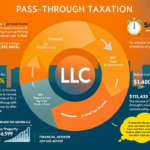If you want to create a distinct separation between your investments and your personal funds, consider creating an LLC for rental property. LLCs afford their owners certain business protections while also making it easier for you to stay on top of your properties’ needs.
What Is an LLC for Rental Property?
An LLC is a limited liability company that requires at least one contributor for formal recognition. If you choose to make an LLC for your rental property, you can lead the operation yourself and collaborate with a team member or a group of industry professionals. You will have to award rights and compensation appropriately based on the division of labor throughout your LLC. Still, partner contribution can make managing this new institution a little easier.
The process of creating a rental property LLC varies from state to state. With that in mind, be aware not only of the start-up costs that come with this development but of any tax expectations that may come alongside it. If you’re working on a shoestring budget, you’ll need to ensure that you have all of your finances in perfect working order.
LLC vs. Sole Proprietorship
Again, LLCs may be owned by a single party, but they don’t have to be run by that single party. If you want to bring in another partner or even a group of fellow investors, you all can work together for the benefit of your rental properties. Sole proprietorships, comparatively, are businesses that only a single person may operate.
While sole proprietorships may be easier to set up than LLCs, they also come with fewer protections. LLCs create a distinct separation between your personal funds and your business investments. If you run a sole proprietorship, your assets may be impacted every time something goes amiss on one of your properties.
What Are the Benefits of an LLC for a Rental Property?
Limited liability companies come with their own array of benefits. That’s what makes them so appealing to many initial investors. These benefits include:
Decreased Personal Risk
If you don’t create an LLC to stand between you and your investments, your individual finances begin to fluctuate based on those investments’ success. In turn, lawsuits, decreasing property value, and market fluctuations can all damage the funds you’ve set up for your personal needs. Creating an LLC, comparatively, puts a barrier between your personal finances and your investments.
Improved Organization
Without a buffer between your personal investments and your public ones, it’s easy to see some overlap between your assets. If you want to improve your investment organization, you can create an individual LLC for each property you wish to lease. Not only does this help you better track the progress of each of your investments, but it also protects your broader portfolio from any trouble that may arise at individual rental sites.
Tax Benefits
LLCs benefit from pass-through taxation on a federal level. Because you own the business on top of your rental properties, the United States government allows you to include the profit made through your LLC among your personal earnings. In turn, the taxes you’re expected to pay on your business may be less than you initially anticipated. That said, you can still work with a tax attorney to determine how the development of a new company may contribute to your expenses, especially with your state’s property taxes in mind.
Creating an LLC
As mentioned, the process of creating an LLC for your rental properties will vary based on the state you’ve invested in. Most of the time, though, the process requires you to:
- Transfer your mortgage title to the business
- Discuss increased interest rates with your mortgage holder
- Inform existing residents of the change in ownership (even if you’re still at the helm)
- Research applicable taxes, including Title Transfer taxes, and assess their impact on your budget
With all of this in mind, you’re wisest to establish your LLC before rearranging your investment portfolio. When you’ve taken the time to establish your LLC, you can more easily guide bank representatives and other professionals through ownership changes.
Do You Need an LLC for Your Rental Property?
An LLC serves as an efficient, organization-oriented barrier between your rental investments and your personal funds. But whether or not you need an LLC for your property is a question of personal interest. You can sit down with a professional to discuss your operating options and determine how an LLC may benefit your investments.










